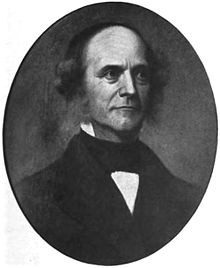Horatio Bridge
|
Commodore Horatio Bridge |
|
|---|---|

After a portrait by Eastman Johnson
|
|
| Born |
April 8, 1806 Augusta, Maine, U.S. |
| Died | March March 18, 1893 (aged 86) Athens, Pennsylvania, U.S. |
| Allegiance |
|
| Service/branch |
|
| Years of service | 1838–1871 |
| Rank |
|
| Commands held | Bureau of Provisions and Clothing |
| Battles/wars | American Civil War |
Horatio Bridge (April 8, 1806 – March 18, 1893) was an officer of the United States Navy who, as Chief of the Bureau of Provisions, served for many years as head of the Navy's supply organization. Appointed by his former college mate, President Franklin Pierce, Bridge held this post under various administrations, including the whole period of the Civil War.
He also had the distinction of being the first man in the Navy to employ the idea of comprehensive fleet supply. Under his direction, the systematic supply of Navy vessels on the Atlantic and Gulf coasts during the Civil War was established and carried out with conspicuous success.
The son of a judge, Bridge was born at Augusta, Maine. He received his early education in private schools and at Hallowell Academy. Bridge was graduated from Bowdoin College in the class of 1825, which included among its members Nathaniel Hawthorne and Henry Wadsworth Longfellow. According to a newspaper item of 1893, it was Horatio Bridge’s appreciation of Hawthorne’s early writings, and his faith in this man of genius, that, to use Hawthorne’s own words, "was responsible for my being an author". One of his later books, The Snow-Image, and Other Twice-Told Tales, was dedicated to his friend and benefactor, Horatio Bridge.
The Commodore himself wielded a graceful pen, and besides contributions to periodicals was the author of The Journal of an African Cruiser, which was edited by Hawthorne, and Personal Recollections of Nathaniel Hawthorne.
After graduation from Bowdoin College, he studied law at Northampton Law School; was admitted to the bar, and practiced his profession at Augusta and Skowhegan (then Milburn), Maine. After ten years of practice, he found law distasteful to him and entered the U.S. Navy as a purser in 1838. After several long cruises in African, European, and Pacific waters, he was called to Washington and appointed Chief of the Navy's Bureau of Provisions and Clothing.
...
Wikipedia
